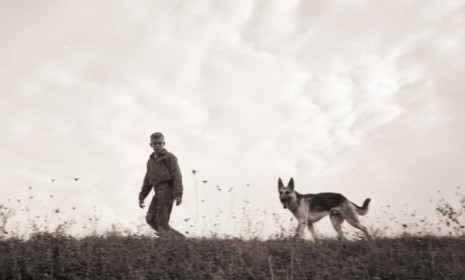Discovered: Man's oldest best friend
Two 33,000-year-old dog skulls suggest that dogs were the first animals to be domesticated by humans, and may have even served as ancient pets

A free daily email with the biggest news stories of the day – and the best features from TheWeek.com
You are now subscribed
Your newsletter sign-up was successful
It turns out that man and dog have been best friends for a lot longer than we thought. Scientists have discovered two 33,000-year-old dog skulls in Siberia and Belgium that offer strong evidence that the animals were loyal to early humans. (See an image of the Siberian skull below.) Here's what you should know:
How do we know these ancient dogs were domesticated?
Their bone structures more closely resemble modern day pooches than they do the ancient wolves from which dogs descended. The dog skulls have shorter snouts, wider jaws, and closer-cropped teeth than wild animals of the day had — wolves, for example, used their long, thin snouts to track and hunt prey. "Domestication results in this shortening of the snout," says study co-author Greg Hodgins at the University of Arizona, who suggests these ancient dogs were human companions.
The Week
Escape your echo chamber. Get the facts behind the news, plus analysis from multiple perspectives.

Sign up for The Week's Free Newsletters
From our morning news briefing to a weekly Good News Newsletter, get the best of The Week delivered directly to your inbox.
From our morning news briefing to a weekly Good News Newsletter, get the best of The Week delivered directly to your inbox.
Does this mean dogs were the first domesticated animals?
It certainly suggests that "dogs were domesticated long before any other animal, including sheep, cows, or goats," says Britain's Telegraph. Up until now, says Hodgins, we assumed our ancestors first domesticated animals that would "produce food through meat or secondary agricultural products like milk, cheese, and wool." But these ancient "dogs [were] not necessarily providing products or meat. They [were] probably providing protection, companionship and perhaps helping on the hunt," he said. That this was apparently man's first relationship with animals is "really interesting."
Is my dog related to these ancient dogs?
Probably not, actually. The newly-discovered skulls predate the "last great ice age," which occurred between 19,000 and 26,000 years ago, says Rebecca Searles at The Huffington Post. During the ice age, "ice sheets severely disrupted life for humans and animals," suggesting that "neither the Belgian nor the Siberian lineages survived the severe conditions."
A free daily email with the biggest news stories of the day – and the best features from TheWeek.com
Sources: The Huffington Post, io9, Telegraph, United Press International
-
 Political cartoons for February 16
Political cartoons for February 16Cartoons Monday’s political cartoons include President's Day, a valentine from the Epstein files, and more
-
 Regent Hong Kong: a tranquil haven with a prime waterfront spot
Regent Hong Kong: a tranquil haven with a prime waterfront spotThe Week Recommends The trendy hotel recently underwent an extensive two-year revamp
-
 The problem with diagnosing profound autism
The problem with diagnosing profound autismThe Explainer Experts are reconsidering the idea of autism as a spectrum, which could impact diagnoses and policy making for the condition